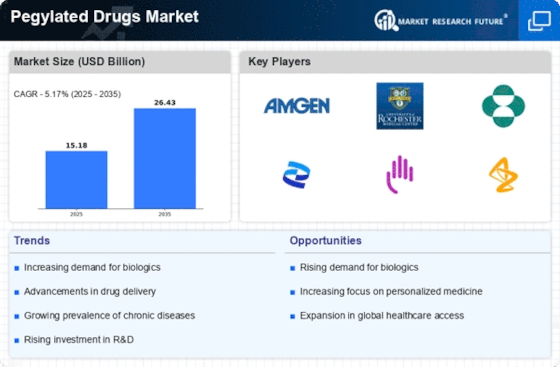Market Trends
Key Emerging Trends in the PEGylated Drugs Market
The number of chronic diseases, especially cancer, is on the rise worldwide. Various types of cancer are becoming more common, causing a significant impact on global health. According to the World Cancer Research Fund International, cancer led to 8.8 million deaths in 2015, and it's responsible for about one in six deaths globally.
In 2016, the National Cancer Institute reported a staggering 15.5 million new cases of cancer, with a whopping USD 147.3 billion spent on cancer care in the United States alone. The numbers are expected to climb even higher, with a projected 23.6 million new cases of cancer per year in the US by 2030. Canada also faced its share, with an estimated 206,200 new cases of cancer and 80,800 deaths in 2017, as reported by the Canadian Cancer Society. The United Kingdom saw a significant percentage, with over 65.3% of total cancers occurring in adults aged 65 years in 2016, according to the Office for National Statistics. Additionally, Cancer Research UK highlighted the four most common cancers globally: lung, female breast, bowel, and prostate cancer.
This surge in cancer cases is creating a pressing need for effective drugs to treat the disease. To meet this demand, advanced drug delivery systems using PEGylation technology are gaining prominence, especially in anti-cancer therapy. PEGylation involves modifying therapeutic molecules to enhance their retention time in the body, and this is expected to drive the growth of the global PEGylated drugs market.
Understanding the impact of cancer on individuals and society, it's crucial to find ways to improve the effectiveness of cancer treatments. PEGylation technology is proving to be a game-changer in this regard, offering a more efficient method of drug delivery.
The significance of PEGylation lies in its ability to improve the retention time of therapeutic drugs in the body. This means that the drugs stay in the system longer, providing a sustained and more effective treatment for cancer. As the global prevalence of cancer continues to rise, the demand for such advanced drug delivery systems is expected to grow, making PEGylated drugs an essential player in the field of anti-cancer therapy.


















Leave a Comment